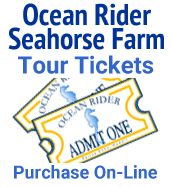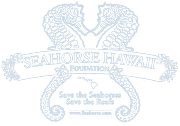Ocean Rider Seahorse Farm and Tours | Kona Hawaii › Forums › Seahorse Life and Care › more fry ?’s › Re:more fry ?’s
Dear Nigel:
It’s good to hear that your Zulus arrived in good shape and are making themselves right at home in your seahorse tank.
Gravid males do behave somewhat differently; as their pregnancy progresses, they are less mobile and often become real home bodies, since they cannot expose their developing brood to any unnecessary risks. They tend to hole up and may even go into hiding; they may go off to feed and miss a meal or two or fail to show up at the feeding station now and then. So pregnant males do sometimes become shy and reclusive, but I wouldn’t exactly say they become antisocial. They may seclude themselves somewhat, but they still remain very much interested in the fillies and will often continue to flirt and conduct daily greetings in the morning throughout their pregnancies. And he shouldn’t refuse to eat altogether.
I wouldn’t use the copper water from your seahorse tank or water from the reef tank that’s having the problem with it right now for your nursery tank. I would just fill the nursery tank with freshly mixed saltwater that you’ve matched to the same temperature, pH and specific gravity as your seahorse tank. You’ll be performing small water changes very regularly in your nursery tank, so you’ll need to keep freshly mixed saltwater on hand at all times once the fry arrive, and you might as well mix up a big batch of fresh saltwater right now.
I assume that you’re running copper in your seahorse tank due to the problems you’ve been having with ich in your reef system, Nigel. You might consider reducing the specific gravity of your seahorse tank to around 1.010-1.012, if there are no delicate invertebrates in the tank, since reduced salinity at that level is very effective in controlling Cryptocaryon irritans or saltwater ich. That’s a treatment that’s commonly known as Osmotic Shock Therapy (OST), and it’s easier to maintain the hyposalinity than it is to regulate a therapeutic dose of copper sulfate, and the OST will be safer for your seahorses since there’s no risk of overdosing them on copper.
In addition, many reef keepers use a modified version of OST or hyposalinity when they have a parasite problem in their reef systems, Nigel. They will reduce the salinity to around 1.016, which most corals seem to tolerate well, but which helps to greatly reduce problems with ich and other ectoparasites. Let me know if you think you might want to try hyposalinity or OST on your seahorse tank and/or your reef system, and I will be happy to send you detailed instructions on how to proceed.
Best of luck with your Zulus and rearing their fry, Nigel!
Happy Trails!
Pete Giwojna




